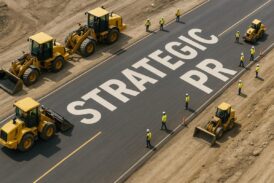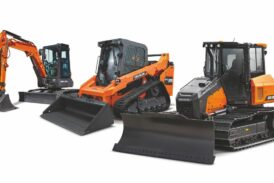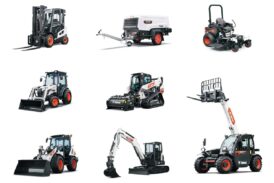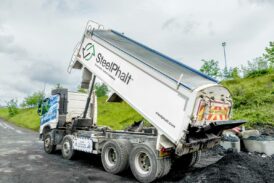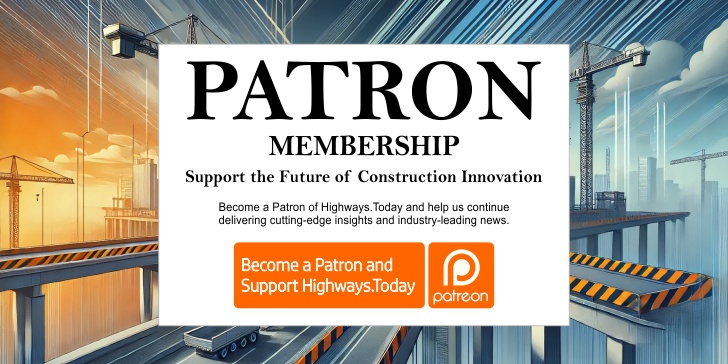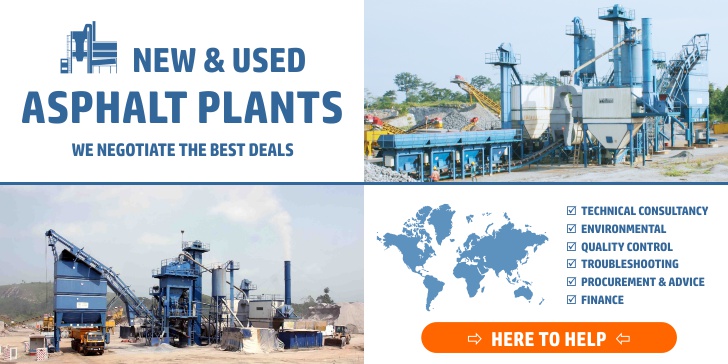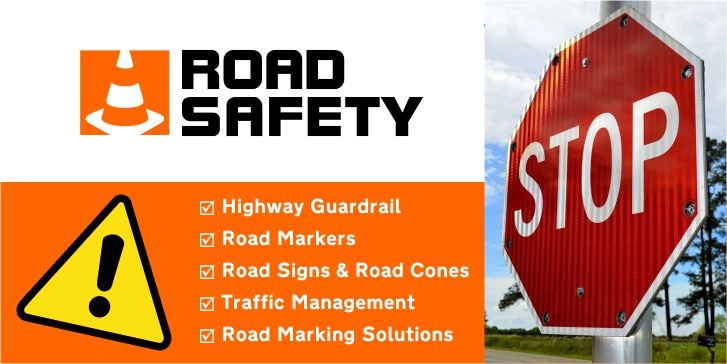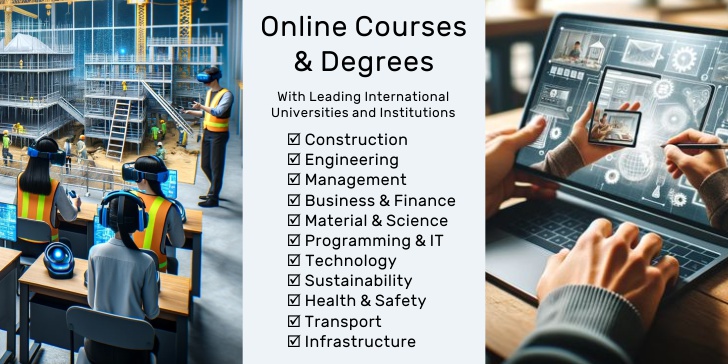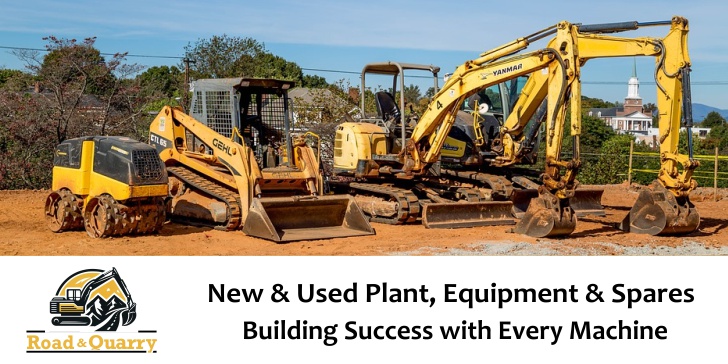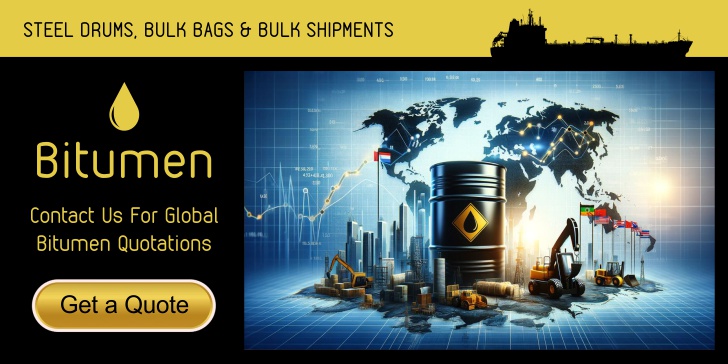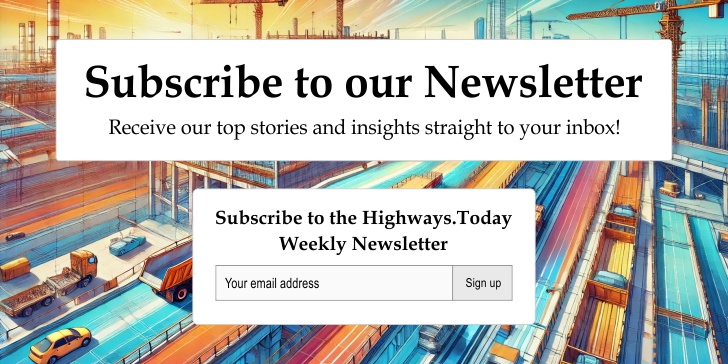
Construction Marketing Month
Welcome to Construction Marketing Month at Highways.Today, where we dive into the complex and ever-evolving world of marketing for construction businesses.
During the month, we will take you on a journey through the multifaceted landscape of marketing, exploring strategies that can elevate your brand from local job sites to international markets. As competition intensifies and the industry advances, effective marketing has never been more crucial. From leveraging digital platforms and navigating the press to mastering branding and public relations, we’ll guide you through the essential elements that will help you connect with your audience, build your reputation, and grow your business in today’s dynamic environment.
Whether you’re a small contractor looking to make a mark in your community or a large firm aiming to expand globally, this guide will equip you with the insights, tools, and strategies needed to successfully market your construction business.

Introduction to Construction Marketing
Marketing in the construction industry is often overlooked, yet it plays a pivotal role in building brand visibility, attracting new clients, and staying ahead of competitors. Unlike other sectors, construction marketing isn’t just about promoting products or services; it’s about establishing trust, demonstrating expertise, and showcasing the value your company brings to the table.
From the first brick laid to the final inspection, every project tells a story, and effective marketing ensures that your company’s story reaches the right audience.


Why is Marketing Crucial for Construction Companies?
In a sector traditionally dominated by word-of-mouth and long-standing relationships, the need for a strategic marketing approach has never been more important. The modern construction landscape is highly competitive, with companies vying for attention not just locally, but on a national and international scale. With clients becoming more informed and selective, marketing helps you differentiate your business, highlight your unique strengths, and connect with your target market on a deeper level.
Marketing in construction goes beyond the basics of advertising. It encompasses a wide range of activities, from maintaining a professional website and engaging on social media, to leveraging trade publications, managing public relations, and conducting market research. Whether you’re a small contractor or a large multinational firm, having a cohesive marketing strategy enables you to showcase your expertise, build credibility, and generate a steady pipeline of leads.
Connecting with Local and International Audiences
Construction marketing is not a one-size-fits-all approach; it requires a tailored strategy to address the distinct needs of different markets. Locally, the focus might be on building community relationships, showcasing projects in familiar neighbourhoods, and engaging through local media outlets. For international audiences, the emphasis shifts towards demonstrating global capabilities, adherence to international standards, and showcasing flagship projects that speak to a broader market.
Navigating these complexities can be challenging, but with the right approach, your marketing efforts can open doors to new opportunities, help establish your brand as an industry leader, and drive business growth. Throughout this month, we will explore each facet of construction marketing, providing practical insights and actionable strategies to help your company thrive in a competitive environment.
Join us on this journey as we uncover the essential components of successful marketing for construction companies. From leveraging digital innovations to mastering traditional marketing techniques, you’ll discover how to elevate your brand, connect with your target audience, and ultimately, build a marketing foundation that supports your long-term business goals.

Featured Construction Marketing Articles
Read more Marketing News.

Building a Comprehensive Marketing Strategy with Market Research
Creating a successful marketing strategy for your construction business requires more than just clever advertising or a strong social media presence—it’s about developing a well-rounded, data-driven approach that aligns with your business goals and speaks directly to your target audience.
At the core of this strategy is market research, which provides the insights necessary to understand your clients, assess your competition, and identify the opportunities that will set your company apart.





Defining Your Marketing Goals and Objectives
The first step in building a comprehensive marketing strategy is to clearly define what you want to achieve. Are you looking to increase brand awareness, generate more leads, win larger contracts, or expand into new markets? Setting specific, measurable, attainable, relevant, and time-bound (SMART) goals will guide your marketing efforts and help you track progress.
Whether you’re a local contractor seeking to dominate your region or an established firm aiming for international expansion, your marketing goals should align with your overall business objectives.
Identifying Your Target Audience
Understanding who your ideal clients are is crucial to crafting messages that resonate. Market research helps you define your target audience, which could include project owners, developers, architects, general contractors, or government bodies, depending on your niche.
Consider their pain points, preferences, and decision-making processes. Are they driven by cost, quality, speed, sustainability, or innovation?
Segmenting your audience allows you to tailor your marketing approach to address specific needs, ensuring that your messaging is both relevant and compelling.
Conducting Market Research to Understand the Landscape
Market research is the backbone of your marketing strategy, offering insights that inform every decision you make. Begin by analysing the market to understand current trends, client demands, and competitive dynamics.
This can involve reviewing industry reports, analysing customer feedback, conducting surveys, and keeping an eye on what your competitors are doing.
- Competitor Analysis: Examine your competitors to see how they position themselves, what marketing tactics they use, and what gaps exist in their offerings. Identifying their strengths and weaknesses can help you carve out your unique value proposition and find opportunities to differentiate your brand.
- Customer Insights: Gather feedback from past and current clients to learn what they value most about your services and where there’s room for improvement. Use this data to refine your marketing messages and improve client satisfaction.
- Trend Analysis: Stay updated on industry trends, such as emerging technologies, sustainability practices, or shifts in regulatory standards. Understanding these trends allows you to adapt your marketing strategy and highlight how your company is ahead of the curve.
Developing a Tailored Marketing Plan
Once you have a solid understanding of the market landscape and your target audience, it’s time to develop a marketing plan that integrates both digital and traditional tactics.
Your plan should include:
- Brand Positioning: Define how you want your brand to be perceived in the market. Are you the innovative leader, the cost-effective choice, or the expert in sustainable construction? Your positioning statement will serve as the foundation of all your marketing communications.
- Digital Marketing Tactics: From website optimization and SEO to social media engagement and content marketing, digital channels offer powerful tools to reach your audience. Create a content calendar that highlights your expertise through blog posts, case studies, videos, and white papers.
- Offline Marketing Tactics: Don’t overlook the value of traditional marketing. Attend industry trade shows, sponsor local events, and build relationships with key stakeholders. Print materials, direct mail, and networking still play a significant role in construction marketing.
- Budget Allocation: Allocate your marketing budget based on the channels that deliver the highest return on investment. Test different tactics, measure their effectiveness, and adjust your spending to focus on what works best.
Measuring Success and Refining Your Strategy
A marketing strategy is not a static document—it requires constant evaluation and adjustment. Use analytics tools to track the performance of your campaigns and measure against your original goals. Monitor key metrics such as website traffic, lead generation, conversion rates, and client engagement.
Regularly review your strategy and make data-driven adjustments to ensure it remains effective and aligned with your business objectives.
Building a comprehensive marketing strategy with a foundation in market research empowers your construction company to connect with the right clients, outshine the competition, and achieve sustainable growth.
By understanding the market, crafting a tailored approach, and continuously refining your efforts, you can ensure your marketing strategy supports your company’s long-term success.

Digital Marketing Essentials
Digital marketing is an indispensable component of any modern construction marketing strategy. In an industry that’s increasingly competitive, having a strong digital presence not only boosts your visibility but also positions your company as a leader in the field.
From website optimization to social media engagement, digital marketing offers a powerful set of tools to connect with clients, showcase your expertise, and drive business growth. Here’s how you can effectively leverage digital marketing to elevate your construction business.







Optimizing Your Website for Maximum Impact
Your website is often the first impression potential clients will have of your company—it’s your digital storefront.
An optimized, user-friendly website can be a powerful marketing tool that communicates your brand’s value and expertise.
Key elements of a high-performing construction website include:
- Professional Design and Branding: Your website should reflect your company’s brand identity through consistent design, colours, and messaging. It should convey professionalism and instil confidence in visitors.
- SEO (Search Engine Optimization): SEO is crucial to ensuring your website appears in search engine results when potential clients look for construction services. Use targeted keywords relevant to your business, such as “commercial construction,” “general contractor,” or “highway engineering,” and optimize your site’s content, meta tags, and headings.
- Showcase Projects and Case Studies: Highlight your past work with detailed project pages, including high-quality images, descriptions, and client testimonials. This not only demonstrates your capabilities but also builds trust with prospective clients.
- Clear Calls to Action (CTAs): Make it easy for visitors to contact you, request a quote, or schedule a consultation. Clear CTAs placed strategically throughout your site guide potential clients towards taking the next step.
Leveraging Social Media to Build Engagement
Social media platforms offer unique opportunities to connect with your audience, share your work, and engage in industry conversations.
For construction companies, social media is not just about posting updates—it’s about building relationships and establishing your brand as a thought leader. Key platforms include:
- LinkedIn: Ideal for B2B networking, LinkedIn allows you to connect with industry professionals, share company updates, and publish thought leadership content. Post project highlights, company news, and industry insights to engage your network.
- Instagram and Facebook: These visually-driven platforms are perfect for showcasing your projects through photos and videos. Share behind-the-scenes looks at your job sites, time-lapse videos of projects, and employee spotlights to humanize your brand.
- YouTube: Video content is highly engaging and can be used to showcase projects, provide tutorials, or offer insights into construction processes. Consider creating a YouTube channel where you can post project walkthroughs, safety tips, or expert interviews.
Content Marketing: Establishing Authority Through Valuable Information
Content marketing involves creating and sharing valuable content that educates your audience, answers their questions, and positions your company as an industry expert. Effective content marketing strategies include:
- Blogging: Regularly publish blog posts on your website that cover industry trends, construction tips, project highlights, and company news. Well-written blogs not only attract visitors but also improve your site’s SEO.
- White Papers and E-books: Offer in-depth resources that address complex topics in construction, such as sustainable building practices, safety regulations, or new technology trends. These can be gated content, requiring visitors to provide their contact information to access them, generating leads for your sales team.
- Case Studies: Detailed case studies that showcase successful projects provide proof of your expertise and problem-solving capabilities. Highlight challenges faced, solutions implemented, and results achieved to demonstrate your value to prospective clients.
Email Marketing: Nurturing Leads and Staying Connected
Email marketing remains one of the most effective ways to nurture leads and keep your audience informed about your company. Use email campaigns to:
- Stay Top-of-Mind: Regular newsletters keep your company front and centre with clients and prospects. Share updates on recent projects, industry news, and upcoming events.
- Personalize Communications: Segment your email list to send targeted messages to different audience groups, such as past clients, current prospects, or industry partners. Personalized emails are more likely to engage recipients and prompt action.
- Promote Content: Use email to distribute your latest blog posts, case studies, or white papers. Drive traffic back to your website and encourage readers to engage with your content.
Digital Advertising: Reaching Targeted Audiences
Paid digital advertising can significantly amplify your marketing efforts, helping you reach highly targeted audiences quickly.
Key advertising tactics include:
- Google Ads: Pay-per-click (PPC) advertising on Google can place your company at the top of search results, driving immediate traffic to your website. Use targeted keywords related to your services and locations to capture interested leads.
- Social Media Ads: Platforms like LinkedIn, Facebook, and Instagram offer advertising options that allow you to target specific demographics, job titles, and industries. Promote your content, drive website traffic, and generate leads directly from social media.
- Retargeting Ads: Retargeting ads display your advertisements to people who have previously visited your website, keeping your company top-of-mind and encouraging them to return and take action.
Measuring Success and Refining Your Digital Marketing Strategy
Digital marketing offers the advantage of measurable results, allowing you to track the performance of your efforts in real time.
Use analytics tools like Google Analytics, social media insights, and email campaign metrics to evaluate what’s working and what needs improvement.
Regularly review your strategy, make data-driven adjustments, and stay agile in your approach to ensure ongoing success.
By leveraging these digital marketing essentials, construction companies can effectively connect with their audience, showcase their expertise, and drive business growth in an increasingly digital world.
A strategic, well-executed digital presence is not just an option—it’s a necessity in today’s market.

Leveraging Press and Public Relations
In the construction industry, where trust and reputation are everything, Public Relations (PR) plays a crucial role in building credibility, enhancing brand visibility, and managing how your company is perceived in the marketplace.
Effective PR goes beyond just press releases—it’s about strategically communicating your company’s story, achievements, and values to the right audience at the right time.
To truly maximize your marketing efforts, engaging the services of experienced PR and digital agencies can make all the difference, helping your company stand out in a crowded market and achieve greater impact.





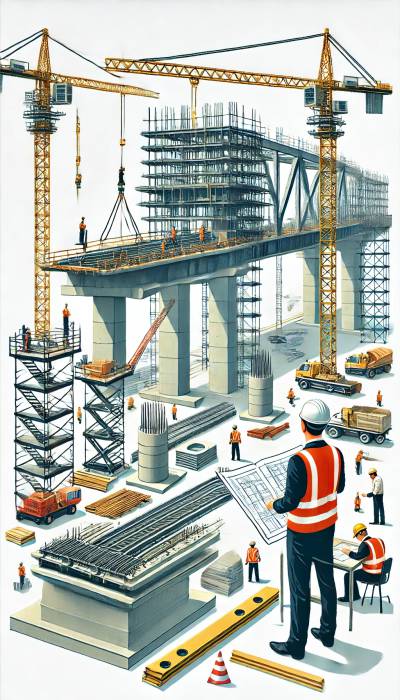
The Power of PR in the Construction Industry
Public Relations is about engaging with and creating positive relationships between your company and your audiences – clients, stakeholders, the media, and the general public.
For construction companies, PR can be a powerful tool to:
- Enhance Brand Reputation: Consistent, positive media coverage positions your company as a trusted authority in the industry. Whether you’re sharing news about completed projects, company milestones, or innovative solutions, PR helps establish your brand as a leader.
- Manage Public Perception: In an industry where mistakes can have significant repercussions, PR is vital for managing your company’s image during challenging times. From crisis management to proactive reputation building, PR helps you control the narrative.
- Highlight Expertise and Innovation: PR allows you to showcase your company’s expertise, innovations, and unique capabilities. Thought leadership articles, expert commentary, and features in trade publications help position your team as go-to experts in your field.
Why Partner with Experienced PR and Digital Agencies?
Many construction companies handle PR in-house, but without the right expertise and industry connections, opportunities can easily be missed, leaving you messaging falling flat or being delivered to the totally wrong audience.
Partnering with experienced PR and digital agencies brings a wealth of benefits that can elevate your marketing efforts:
- Access to Industry Expertise: PR and digital agencies specializing in construction understand the nuances of the industry, including its unique challenges, audiences, and media landscape. They know which stories resonate, how to position your brand, and the best channels to reach your target market, whether B2B or to the public.
- Strategic Storytelling: PR is not just about getting media coverage; it’s about telling your company’s story in a way that engages and inspires. Agencies help craft compelling narratives that highlight your company’s strengths, successes, and values, making your brand memorable.
- Media Connections and Pitching Expertise: Experienced agencies have established relationships with journalists, editors, and influencers in the construction and business sectors. They have spent the time building relationships and know how to pitch your stories effectively to secure valuable media placements that boost your brand’s visibility.
- Crisis Management and Reputation Protection: In an industry very prone to public and government scrutiny, having a PR agency on your side ensures that you are prepared to handle any potential crises swiftly and effectively. Agencies provide expert guidance on navigating difficult situations, protecting your brand’s reputation when it matters most.
- Integrated Digital PR Strategies: Today’s PR goes hand-in-hand with digital marketing. Agencies offer integrated strategies that combine traditional PR with digital tactics, such as social media management, content marketing, and SEO optimization, to amplify your reach and engagement.
Maximizing Your PR Impact: Key Tactics to Consider
- Press Releases and Media Outreach: Regular press releases about new projects, contract wins, and company updates keep your brand in the public eye. Agencies ensure your news reaches the right journalists and publications, increasing your chances of coverage.
- Thought Leadership and Expert Commentary: Position your company as an industry thought leader by contributing articles, insights, and expert opinions to trade magazines and online platforms. Agencies can help craft and place these pieces, boosting your credibility.
- Case Studies and Project Features: Showcasing your work through detailed case studies and project features in industry media highlights your expertise and the value you bring to clients. PR agencies can facilitate these placements, helping you reach a wider audience.
- Award Submissions and Recognition: Winning industry awards enhances your company’s reputation and distinguishes you from competitors. Agencies can identify relevant awards, craft compelling submissions, and manage the application process on your behalf.
- Crisis Communications Planning: A well-prepared crisis communications plan is essential for mitigating potential damage during challenging times. PR agencies develop these plans and provide on-the-ground support when issues arise, ensuring your company’s response is timely and effective.
Choosing the Right PR and Digital Agency Partner
Selecting the right PR and digital agency is critical to maximizing your investment.
Look for agencies with:
- Construction Industry Experience: Choose agencies that have a proven track record in the construction sector and understand its unique dynamics.
- Strong Media Relationships: An agency with established media connections can open doors to valuable opportunities that might otherwise be out of reach.
- Integrated Services: Agencies that offer both PR and digital marketing services provide a holistic approach, ensuring that all aspects of your communications work together seamlessly.
- Strategic Insight: Beyond just executing campaigns, a great agency will provide strategic insights, advising on the best ways to achieve your marketing goals.
Inspiring Action Through PR
Public Relations is more than just publicity—it’s a strategic asset that can elevate your brand, protect your reputation, and connect you with the audiences that matter most. By partnering with experienced PR and digital agencies, construction companies can unlock new opportunities, tell their stories more effectively, and achieve greater marketing success.
Don’t just be a part of the conversation—lead it, with the right PR strategy driving your construction business forward.

Effective Use of Advertising Channels
Advertising is a powerful way to reach your target audience, boost brand awareness, and drive business growth in the construction industry. With a multitude of channels available, from traditional print to cutting-edge digital platforms, the key lies in selecting the right mix that aligns with your marketing goals and budget.
For construction companies, leveraging advertising opportunities on industry-specific platforms like Highways.Today can significantly enhance your reach and impact, connecting you directly with key decision-makers and influencers in the sector.






The Power of Targeted Advertising in Construction
Construction advertising isn’t about casting the widest net—it’s about strategically placing your brand in front of the right audience at the right time.
Whether you aim to attract project owners, contractors, engineers, or industry partners, targeted advertising allows you to speak directly to those who matter most to your business. By using well-crafted ads, you can showcase your projects, highlight your services, and build credibility with a highly engaged audience.
Highways.Today: A Leading International Construction News Platform
One of the most effective advertising strategies is to place your brand on platforms that are trusted and frequented by your target market. Highways.Today is a prime example of such a platform—recognized globally as a leading source of construction news, insights, and industry updates.
Advertising on Highways.Today offers a unique opportunity to reach a wide, engaged audience of construction professionals, decision-makers, and industry influencers.
- Reach a Global Audience: Highways.Today attracts readers from around the world, providing your company with exposure to international markets. Whether you’re targeting local, national, or global audiences, this platform ensures your message reaches those who are actively seeking construction news and solutions.
- Build Credibility and Trust: Being featured on a respected platform like Highways.Today instantly boosts your company’s credibility. When your ads appear alongside high-quality industry content, it reinforces your brand’s authority and positions your company as a leader in the construction space.
- Diverse Advertising Options: Highways.Today offers a variety of advertising formats to suit your needs, including banner ads, sponsored content, video placements, and newsletter sponsorships. This flexibility allows you to tailor your campaigns to your specific goals, whether it’s driving website traffic, generating leads, or increasing brand awareness.
- Showcase Your Expertise: Sponsored content on Highways.Today, such as articles or case studies, allows you to tell your company’s story in a more detailed and engaging way. Highlight successful projects, share industry insights, or promote new innovations to demonstrate your expertise and value to potential clients.
Maximizing Your Advertising Spend: Key Channels to Consider
- Digital Advertising: Online advertising offers unparalleled targeting options and measurable results. Platforms like Google Ads enable you to place your company at the top of search results, capturing potential clients actively searching for construction services. Social media ads on LinkedIn, Facebook, and Instagram allow you to reach specific demographics, industries, and job roles with tailored messages.
- Trade Publications and Websites: Advertising in trade publications and websites such as Highways.Today ensures that your brand reaches a highly relevant audience. These platforms are trusted sources of information for industry professionals, making them ideal for brand-building and lead generation.
- Retargeting Ads: Retargeting keeps your brand in front of users who have previously visited your website, reminding them of your services and encouraging them to return. Retargeting ads are particularly effective for construction companies, as decision-making processes can be lengthy, and consistent visibility helps keep your brand top-of-mind.
- Print Advertising: Despite the rise of digital, print advertising in trade magazines, industry directories, and local newspapers remains a valuable tool for reaching specific audiences, particularly in markets where traditional media is still influential. High-quality print ads can effectively showcase your brand’s professionalism and attention to detail.
- Outdoor Advertising: Billboards, signage, and other outdoor ads placed near construction sites, highways, or trade events can capture the attention of potential clients in a relevant context. Outdoor advertising is a powerful way to reinforce your brand’s presence in the real world.
Crafting Compelling Ads That Resonate
To make the most of your advertising investment, it’s crucial to create ads that are visually appealing, clear, and directly address your audience’s needs.
Here are some tips for crafting effective advertisements:
- Strong Visuals: Use high-quality images or videos that highlight your projects, services, and company culture. Visuals are the first thing people notice, and they should instantly convey the quality and scope of your work.
- Clear Messaging: Your ad copy should be concise, compelling, and focused on the benefits you offer. Use powerful headlines and call-to-action phrases that encourage viewers to take the next step, whether it’s visiting your website, downloading a brochure, or contacting your team.
- Consistency Across Channels: Ensure that your brand’s messaging and visual style are consistent across all advertising channels. A unified approach helps reinforce your brand identity and makes your company easily recognizable, no matter where your audience encounters your ads.
Measuring Success and Refining Your Approach
The beauty of modern advertising is the ability to measure performance in real-time. Use analytics tools to track key metrics such as impressions, clicks, conversions, and return on investment (ROI).
Regularly review your ad performance and refine your strategy based on what’s working. A/B testing different headlines, visuals, and calls to action can also help optimize your ads for better results.
Advertising on a reputable platform like Highways.Today provides construction companies with a strategic advantage, connecting you directly with a global audience of industry professionals.
By choosing the right advertising channels and crafting compelling campaigns, you can elevate your brand, drive engagement, and ultimately grow your business. Don’t just advertise—advertise smartly, with targeted strategies that maximize your reach and impact in the construction industry.

Design, Branding, and Market Positioning
In the construction industry, where first impressions are crucial and competition is fierce, a strong brand identity can set your company apart and communicate your value long before you ever meet a client.
Design, branding, and market positioning are not just about logos and colours—they are about defining who you are, what you stand for, and how you are perceived in the market. Effective branding creates a powerful connection with your audience, builds trust, and positions your company as the go-to choice in a crowded field.






The Power of Branding in Construction
Branding is more than just a visual identity; it’s the complete perception of your company in the minds of your clients, partners, and stakeholders. A well-defined brand communicates your expertise, professionalism, and the unique value you bring to the table.
For construction companies, this means showcasing reliability, quality, and innovation through every touchpoint—from your website and marketing materials to your job sites and employee uniforms.
Key Elements of Strong Branding
- Brand Identity and Visual Design: Your brand identity is the visual representation of your company’s personality and values. This includes your logo, color palette, typography, and imagery. A cohesive and professional design reflects the quality of your work and sets the tone for how your company is perceived.
- Logo Design: Your logo should be simple, memorable, and reflective of your company’s core values. It’s often the first thing people associate with your brand, so invest in a professional design that stands out and represents your business effectively.
- Consistent Color Palette: Colors evoke emotions and are a critical part of your brand’s identity. Choose a color palette that aligns with your brand’s personality—strong, bold colors for innovation and strength, or more muted tones for trust and reliability.
- Typography and Imagery: Consistent typography and high-quality imagery help reinforce your brand message. Choose fonts that are clean and professional, and use images that accurately reflect your projects, team, and company culture.
- Brand Messaging and Voice: Beyond visuals, your brand message communicates who you are, what you do, and why clients should choose you. Your messaging should be clear, concise, and customer-focused, highlighting your unique selling propositions (USPs).
- Tagline: A strong tagline encapsulates your company’s promise and differentiates you from competitors. It should be short, impactful, and memorable.
- Core Values: Clearly communicate your core values, whether it’s a commitment to safety, innovation, quality, or sustainability. These values should be evident in all your communications and actions.
- Brand Voice: Your brand voice is how you communicate with your audience—formal, friendly, authoritative, or conversational. Consistency in tone helps build familiarity and trust.
Market Positioning: Standing Out in the Construction Sector
Market positioning defines how your brand is perceived relative to competitors. It’s about carving out a distinct space in the market that highlights your strengths and sets you apart.
Effective positioning involves understanding your audience, recognizing your competitors, and articulating your unique value.
- Identify Your Unique Selling Propositions (USPs): What makes your company different? Whether it’s unmatched expertise in a niche market, cutting-edge technology, exceptional customer service, or a commitment to sustainability, your USPs should be at the heart of your positioning strategy.
- Understand Your Competitors: Conduct a competitive analysis to see how other companies in your space are positioning themselves. Identify gaps in the market and look for opportunities where you can differentiate your brand.
- Target the Right Audience: Positioning isn’t just about what you offer; it’s about who you offer it to. Clearly define your ideal client profile—whether it’s large commercial developers, local municipalities, or private homeowners—and tailor your messaging to address their specific needs and pain points.
- Deliver Consistent Experiences: Your market positioning should be reflected in every aspect of your business, from your marketing materials to your project delivery. Consistency builds credibility and reinforces your brand promise at every touchpoint.
Design and Branding Best Practices for Construction Companies
- Professional Website Design: Your website really is one of the most important features of every modern business and the central hub for your brand, and its design should be professional, user-friendly, and aligned with your brand identity. High-quality visuals, clear navigation, and engaging content help establish your credibility and make a strong first impression.
- Branded Marketing Materials: From brochures and proposals to business cards and job site signage, every piece of communication should reflect your brand. Invest in professionally designed materials that showcase your work and reinforce your brand’s quality and expertise.
- Employee Branding: Your team is an extension of your brand. Branded uniforms, hard hats, and equipment not only promote your company on job sites but also create a cohesive, professional image that clients and the public recognize.
- Branded Content: Use your brand elements in all content you produce—blogs, social media posts, videos, and presentations. Consistent branding across all platforms helps reinforce your message and makes your company instantly recognizable.
Evolving Your Brand Over Time
As your company grows and the market evolves, so should your brand. Regularly assess your branding and positioning strategies to ensure they still resonate with your target audience. A brand refresh, updated messaging, or a new visual direction can keep your company relevant and aligned with industry trends.
In the construction industry, where reputation and trust are paramount, effective branding and positioning are vital to standing out. A strong brand identity not only attracts clients but also builds lasting relationships by communicating your company’s values and expertise.
By investing in professional design, defining your market position, and delivering a consistent brand experience, you can create a powerful and enduring presence in the construction market. Your brand is your promise—make sure it’s one that clients can rely on.

Future Trends and Innovations in Construction Marketing
The construction industry is evolving rapidly, and with it, the marketing landscape is undergoing significant transformations. As technology advances, client expectations shift, and new platforms emerge, construction companies must adapt their marketing strategies to stay competitive.
Embracing future trends and innovations in construction marketing will not only enhance your brand’s visibility but also position your company at the forefront of industry change. Here’s a look at the key trends shaping the future of construction marketing and how you can leverage them to your advantage.







Embracing Digital Transformation and Data-Driven Marketing
Digital transformation is revolutionizing construction, and marketing is no exception. The adoption of digital tools and data-driven strategies is helping companies gain deeper insights into their clients, optimize marketing, and make informed decisions.
- Artificial Intelligence (AI) and Machine Learning: AI is enhancing marketing automation, enabling companies to analyze vast amounts of data, predict client behavior, and personalize marketing messages. AI-powered chatbots can provide instant responses to client inquiries, improving engagement and lead generation.
- Data Analytics: Data analytics tools are becoming essential for tracking marketing performance and gaining insights into what works. By analyzing website traffic, social media interactions, and client feedback, companies can refine their strategies, improve targeting, and maximize ROI.
- Predictive Analytics: Predictive analytics allows construction companies to forecast market trends, identify potential leads, and tailor marketing campaigns based on past behaviors. This proactive approach helps in anticipating client needs and staying ahead of the competition.
Leveraging Augmented Reality (AR) and Virtual Reality (VR)
AR and VR are no longer just futuristic concepts—they are practical tools that are transforming how construction companies present their projects and engage with clients.
- Virtual Showrooms and Project Tours: VR technology allows potential clients to explore your projects in a virtual environment, offering immersive walkthroughs of completed or in-progress builds. This technology provides a compelling way to showcase your expertise and vision without the need for physical site visits.
- Augmented Reality for Project Visualization: AR can superimpose 3D models of projects onto real-world environments, helping clients visualize the final outcome before construction even begins. This interactive approach not only enhances client experience but also reduces misunderstandings and revisions.
- Training and Safety Demonstrations: VR can also be used for training purposes, simulating construction environments for safety training and skills development, which can be showcased as part of your company’s commitment to quality and safety standards.
Sustainable Marketing and Green Credentials
Sustainability is a critical factor in construction, influencing not only how companies build but also how they market themselves. Clients and stakeholders are increasingly looking for a commitment to environmental responsibility.
- Highlighting Sustainable Practices: Showcase your company’s green credentials by highlighting sustainable building practices, use of eco-friendly materials, and energy-efficient designs in your marketing campaigns. Sharing case studies, certifications, and sustainability reports can strengthen your brand’s appeal to environmentally conscious clients.
- Green Certifications and Partnerships: Promote any green certifications your company has achieved, such as LEED (Leadership in Energy and Environmental Design) or BREEAM (Building Research Establishment Environmental Assessment Method). Partnering with sustainability-focused organizations can also boost your brand’s credibility.
- Eco-Friendly Content Marketing: Create content that educates your audience about sustainable construction practices, the benefits of green building, and how your company is contributing to a more sustainable future. This positions your brand as a thought leader in the sustainability space.
Influencer Marketing and Social Proof
Influencer marketing, traditionally seen in consumer sectors, is making its way into B2B industries, including construction. Leveraging industry influencers can amplify your reach, build trust, and enhance your brand’s reputation.
- Partnering with Industry Influencers: Collaborate with respected figures in the construction industry—such as engineers, architects, or sustainability advocates—to promote your projects and services. Influencers can provide authentic endorsements that resonate with their followers and enhance your credibility.
- Client Testimonials and Case Studies: Social proof remains a powerful marketing tool. Showcase client testimonials, project success stories, and detailed case studies to demonstrate your company’s reliability and expertise. Video testimonials, in particular, add a personal touch and are highly persuasive.
- User-Generated Content: Encourage clients, partners, and employees to share their experiences with your company on social media. User-generated content not only builds community but also serves as genuine endorsements of your brand.
Personalized Marketing and Hyper-Targeting
As the digital landscape becomes increasingly crowded, personalized marketing is key to cutting through the noise and engaging your audience on a deeper level.
- Tailored Content and Messaging: Use data to personalize your marketing messages based on client demographics, behaviors, and preferences. Whether it’s a customized email campaign, a personalized proposal, or a targeted social media ad, personalization increases relevance and response rates.
- Account-Based Marketing (ABM): ABM focuses on tailoring marketing efforts to specific high-value clients or accounts. This approach aligns marketing and sales efforts to create customized experiences for each target account, improving conversion rates and client satisfaction.
- Geo-Targeting and Localized Campaigns: Use geo-targeting to deliver location-specific content and ads that resonate with local audiences. This strategy is particularly effective for promoting regional projects or engaging with communities where your company operates.
Video Content and Live Streaming
Video is one of the most engaging forms of content, and its importance in construction marketing continues to grow. From project showcases to expert interviews, video allows you to communicate complex ideas in an accessible and engaging way.
- Project Timelapse Videos: Capture the transformation of a project from start to finish with timelapse videos. These visually compelling videos are highly shareable and effectively demonstrate your company’s expertise and efficiency.
- Live Streaming and Webinars: Host live Q&A sessions, project walkthroughs, or industry webinars to engage with your audience in real time. Live streaming on platforms like YouTube, LinkedIn, or Instagram provides an interactive way to connect with potential clients and showcase your knowledge.
- Behind-the-Scenes Content: Offer a behind-the-scenes look at your projects, team, and processes. This type of content humanizes your brand and builds a stronger connection with your audience.
The future of construction marketing is dynamic, data-driven, and deeply connected to technological advancements. By embracing these trends and innovations, construction companies can not only enhance their marketing impact but also strengthen their market position, attract new clients, and build lasting relationships.
As the industry continues to evolve, staying ahead of these trends will be key to maintaining a competitive edge and driving your business forward in a rapidly changing landscape.

Trade Shows and Industry Events
Trade shows provide a unique platform to connect face-to-face with industry professionals, stay updated on the latest trends, and gain insights into what competitors are doing. They offer opportunities to showcase your company’s innovations, services, and expertise to a targeted audience, which can lead to new business partnerships, sales leads, and increased brand recognition.








Benefits of Attending and Exhibiting at Trade Shows
- Networking Opportunities: Meet key decision-makers, potential clients, suppliers, and other industry stakeholders. These connections can lead to valuable business opportunities and partnerships.
- Showcasing Innovations: Demonstrate new technologies, products, and services in a live setting, giving potential clients a hands-on experience.
- Learning and Development: Attend seminars, workshops, and panel discussions to learn about emerging trends, regulatory changes, and new technologies impacting the construction industry.
- Brand Visibility and Promotion: Exhibiting at a trade show enhances your brand’s visibility and credibility. It positions your company as a leader in the field, especially when presenting at high-profile industry events.
Tips for Maximizing Your Trade Show Presence
- Pre-Event Marketing: Promote your participation ahead of time through social media, email campaigns, and direct invitations to your network. Let people know where they can find you and what to expect.
- Engaging Booth Design: Invest in a visually appealing booth that reflects your brand with interactive elements, demos, videos, and digital presentations.
- Staff Training: Ensure your booth staff are knowledgeable, engaging, and prepared to answer questions and capture leads effectively.
- Follow-Up Strategy: Collect contact information and follow up promptly after the event with personalized emails or calls to maintain the connection and move potential leads further down the sales funnel.
Planning Your Trade Show Calendar
Stay updated on upcoming trade shows relevant to your market. Planning your calendar in advance allows you to prepare your marketing, set goals, and budget effectively.
Recommended Trade Shows for the Construction Industry
1. CONEXPO-CON/AGG (USA): CONEXPO-CON/AGG is the largest construction trade show in North America, held every three years in Las Vegas. It brings together professionals from every major sector of the construction industry, including earthmoving, lifting, mining, and utilities. With over 2,800 exhibitors and more than 130,000 attendees, this event showcases the latest equipment, innovations, and technologies that are shaping the future of construction. Attendees have the opportunity to see live demonstrations, participate in educational sessions led by industry experts, and network with peers from around the world. Whether you’re looking to explore new technologies, strengthen industry connections, or gain insights into emerging trends, CONEXPO-CON/AGG is a must-attend event for anyone in the construction field.
2. bauma (Germany and International): bauma, held in Munich, Germany, is the world’s leading trade fair for construction machinery, building material machines, mining machines, and construction vehicles. Known for its sheer scale, bauma hosts over 3,700 exhibitors and attracts more than 600,000 visitors from across the globe. In addition to its flagship event in Germany, bauma has expanded to include regional shows such as bauma China, bauma Africa, and bauma Conexpo India, catering to the unique needs of these markets. This trade show is renowned for unveiling the latest innovations in heavy machinery and construction technology, making it an essential event for industry professionals seeking to stay at the forefront of the field.
3. The Big 5 (UAE): The Big 5 is the Middle East’s largest and most influential construction event, held annually in Dubai. It serves as a global hub for the construction industry, bringing together over 2,500 exhibitors and tens of thousands of attendees from around the world. The show covers a wide range of sectors, including building materials, MEP services, interior design, and construction technologies. With a strong focus on sustainability, innovation, and digital transformation, The Big 5 offers a comprehensive look at the latest industry trends and solutions. It’s a key event for professionals looking to connect with global suppliers, discover new products, and explore opportunities in the growing Middle Eastern market.
4. World of Concrete (USA): World of Concrete is the premier event dedicated to the commercial concrete and masonry industries. Held annually in Las Vegas, it attracts over 60,000 professionals who come to see the latest products, equipment, and technologies in action. The show features indoor and outdoor exhibits, live demonstrations, and a comprehensive education program with expert-led seminars and workshops. World of Concrete provides a unique opportunity for concrete and masonry professionals to gain hands-on experience with the latest tools, explore new techniques, and connect with leading manufacturers and suppliers in the industry.
5. World of Asphalt (USA): World of Asphalt is the leading trade show for the asphalt industry, focusing on the equipment, technologies, and services that drive the aggregates, asphalt, pavement maintenance, and traffic safety sectors. Held in various locations across the United States, this event brings together contractors, producers, and government agencies to explore the latest innovations in asphalt production and road building. World of Asphalt features an extensive educational program, live equipment demonstrations, and networking opportunities, making it an essential event for professionals looking to improve their operations and stay ahead of industry trends.
6. Plantworx (UK): Plantworx is the UK’s largest live construction equipment event, showcasing the latest innovations in plant machinery, technology, and services. Held biennially, the show offers a unique hands-on experience with working machinery, allowing attendees to see new equipment in action and explore cutting-edge solutions. Plantworx attracts a wide range of professionals, from small contractors to major infrastructure firms, providing a platform for networking, learning, and discovering the future of construction equipment. It’s an essential event for anyone involved in construction plant and machinery.
7. Hillhead (UK): Hillhead is the largest exhibition of its kind, held in a working quarry in Derbyshire, UK. Specializing in quarrying, construction, and recycling equipment, Hillhead offers a unique opportunity to see heavy machinery in action in a real-world setting. The show features live demonstrations of equipment like crushers, screeners, and excavators, giving attendees a realistic view of how these machines perform in demanding conditions. Hillhead is a must-attend for professionals in mining, quarrying, and heavy construction, providing an unparalleled experience of machinery at work.
8. bauma China (China): bauma China is Asia’s leading trade fair for construction machinery, building materials, and mining machines, held biennially in Shanghai. As a regional extension of the global bauma brand, this event caters specifically to the growing Asian market, attracting over 200,000 visitors and 3,000 exhibitors. bauma China showcases the latest in construction technology and innovation, providing a platform for international companies to connect with Asian partners and clients. It’s an essential event for anyone looking to expand their presence in the dynamic Asian construction market.
9. INTERMAT (France): INTERMAT, held in Paris, is one of Europe’s largest international construction trade shows, covering equipment, materials, and techniques for public works and construction. The show attracts over 200,000 professionals and 1,500 exhibitors, offering a comprehensive overview of the latest industry trends and innovations. With a strong focus on sustainable construction and digital transformation, INTERMAT provides valuable insights into the evolving European construction landscape. It’s a key event for professionals looking to connect with leading suppliers and discover new technologies.
10. Expo CIHAC (Mexico): Expo CIHAC is Latin America’s leading construction trade show, held annually in Mexico City. It brings together over 570 exhibitors and thousands of attendees, showcasing the latest construction solutions, materials, and technologies tailored to the Latin American market. Expo CIHAC offers a deep dive into the unique challenges and opportunities within the region, providing a platform for networking, learning, and exploring new business opportunities. It’s an essential event for construction professionals looking to engage with the Latin American market.
Trade shows are invaluable for construction companies aiming to grow their market presence, generate leads, and engage with the latest industry innovations.
By strategically participating in these events, your company can not only showcase its strengths but also gain insights that drive future growth. Incorporate trade shows into your marketing strategy to maximize your reach and impact within the industry.

Industry Resources and Tools
Navigating the complexities of construction marketing requires not only strategic insights but also the right tools and resources to implement your campaigns effectively. Whether you’re refining your brand, executing digital marketing strategies, or measuring campaign success, having access to industry-specific resources can significantly enhance your marketing efforts.
Below is a curated list of essential resources and tools that construction companies can leverage to optimize their marketing and stay ahead of the competition.








Digital Marketing Tools
Effective digital marketing requires a combination of content creation, SEO optimization, social media management, and performance tracking.
Here are some indispensable tools that can streamline your efforts:
- Google Analytics: A must-have for tracking website traffic, user behaviour, and conversion rates. Google Analytics provides valuable insights into how visitors interact with your site, helping you optimize your digital marketing strategies.
- SEMrush: An all-in-one tool for SEO, content marketing, competitor analysis, and online visibility management. SEMrush helps you identify the right keywords, analyze your competitors’ strategies, and improve your search engine rankings.
- Hootsuite / Buffer: Social media management platforms like Hootsuite and Buffer enable you to schedule posts, track engagement, and manage multiple social media accounts from one dashboard. These tools are essential for maintaining a consistent online presence.
- Mailchimp / Constant Contact: For email marketing, platforms like Mailchimp and Constant Contact offer easy-to-use templates, automation features, and analytics to help you create and manage effective email campaigns that nurture leads and keep your audience engaged.
- Canva: Canva is a user-friendly design tool that allows you to create professional-looking graphics, social media posts, brochures, and presentations. With pre-designed templates, it’s perfect for companies that want to enhance their visual content without needing advanced design skills.
PR and Media Resources
Engaging with the media and managing public relations are crucial for building brand credibility.
Here are some resources to help you manage PR effectively:
- Cision: A leading PR software that provides access to a comprehensive media database, press release distribution, and media monitoring. Cision helps you connect with journalists, track your media coverage, and measure the impact of your PR efforts.
- Muck Rack: Muck Rack offers a media database, journalist outreach, and media monitoring capabilities. It’s a valuable tool for identifying relevant journalists, pitching stories, and tracking mentions of your brand across various media channels.
- PR Newswire: PR Newswire is a trusted service for distributing press releases to targeted media outlets worldwide. It’s ideal for construction companies looking to gain visibility in industry-specific publications and beyond.
Construction-Specific Platforms and Publications
Staying informed about industry trends and connecting with your audience on specialized platforms can give your marketing a competitive edge.
- Highways.Today: As a leading international construction news platform, Highways.Today provides opportunities for advertising, sponsored content, and media coverage, helping you reach a highly targeted audience of construction professionals.
- Construction News: A prominent publication offering industry news, analysis, and insights. Advertising on such platforms can increase your brand’s visibility among key decision-makers in the construction sector.
- ENR (Engineering News-Record): ENR is a widely respected source for news, analysis, and data on construction projects, companies, and market trends. It offers advertising opportunities and valuable content to position your company as an industry leader.
Design and Branding Tools
To ensure your brand stands out, leveraging design tools and branding resources can help you create a professional and consistent brand identity.
- Adobe Creative Cloud: A suite of professional design tools including Photoshop, Illustrator, and InDesign. These tools are essential for creating high-quality marketing materials, from logos and brochures to social media graphics.
- 99designs: If you need professional design work but don’t have an in-house designer, 99designs connects you with a global community of designers who can create logos, brand kits, and other visual assets tailored to your company’s needs.
- Lucidpress: A design and brand management tool that allows you to create branded marketing materials while maintaining brand consistency. Lucidpress is particularly useful for teams that need to collaborate on design projects.
Market Research and Analytics
Understanding your market and competitors is key to crafting effective marketing strategies.
These resources provide valuable data and insights to inform your decision-making.
- IBISWorld: Provides comprehensive industry reports, market data, and competitor analysis specific to the construction sector. IBISWorld helps you stay informed about market trends and competitive dynamics.
- Statista: A powerful platform offering statistics, reports, and insights across various industries, including construction. Statista can be used to gather data on market trends, client behavior, and industry forecasts.
- Dodge Data & Analytics: A leading provider of data, analytics, and intelligence for the construction industry. Dodge helps you identify market opportunities, track project leads, and analyze competitor activity.
Project Management and Collaboration Tools
Streamlined project management and team collaboration can significantly improve the efficiency of your marketing campaigns.
- Asana / Trello: Project management tools like Asana and Trello help teams organize tasks, set deadlines, and collaborate effectively. These platforms are ideal for managing marketing campaigns, tracking progress, and ensuring projects stay on schedule.
- Slack: A communication tool that facilitates real-time messaging, file sharing, and collaboration. Slack helps keep marketing teams connected, especially when working on complex campaigns or coordinating with external agencies.
- Microsoft Teams: An all-in-one communication and collaboration platform that integrates with Microsoft Office tools, making it easy to share documents, schedule meetings, and collaborate on marketing initiatives.
Learning and Development Resources
Continual learning is crucial in the fast-evolving world of marketing. These resources can help you stay updated on the latest trends, tools, and best practices.
- HubSpot Academy: Offers free courses and certifications in digital marketing, SEO, content strategy, and more. HubSpot Academy is a great resource for upskilling your team and staying current with the latest marketing trends.
- LinkedIn Learning: Provides a vast library of courses on marketing, branding, data analysis, and other business skills. LinkedIn Learning allows your team to learn at their own pace and develop the skills needed to execute advanced marketing strategies.
- MarketingProfs: A leading provider of marketing training and resources, offering articles, webinars, and courses specifically tailored to B2B marketers. MarketingProfs provides practical advice and insights to help construction marketers excel.
The right resources and tools can significantly enhance your construction marketing efforts, providing the insights, efficiencies, and capabilities needed to execute effective campaigns.
By leveraging industry-specific platforms, advanced digital tools, and continuous learning opportunities, your company can build a robust marketing foundation that drives growth, strengthens your brand, and sets you apart in a competitive market.

As the construction industry continues to evolve, so too must the strategies we use to connect, engage, and inspire our audiences. Embracing the complexities of marketing—from crafting a compelling brand to leveraging cutting-edge digital innovations—can transform your business, elevating your company from a trusted contractor to a recognized leader in the field.
By investing in a comprehensive marketing approach, utilizing expert agencies, and equipping your team with the right resources and tools, you position your business not just for today’s challenges, but for the opportunities of tomorrow. Let this journey through construction marketing serve as a guide to unlocking your company’s full potential, driving growth, and building a brand that stands the test of time.
Your story is worth telling—make sure the right audience is listening.
We hope this comprehensive guide to construction marketing has provided valuable insights and practical strategies to help your business thrive. However, the conversation doesn’t end here—we want to hear from you! If you have tips, ideas, or suggestions on how we can improve this page, please reach out and share your thoughts. Your feedback helps us create even better content that serves the construction community. Whether it’s a unique marketing tactic that worked for your company or a topic you’d like us to explore further, your input is invaluable. Let’s work together to continue building a resource that empowers construction companies to market smarter, connect deeper, and grow stronger. Get in touch and let’s keep the conversation going!













